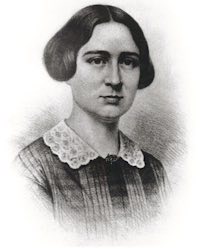As the first woman minister of a recognized denomination (Congregational), Antoinette Brown Blackwell worked throughout her life to validate women’s public role by challenging traditional barriers that restricted them.
Blackwell encountered traditional restraints on women’s intellectual endeavors and social action when she was not permitted to participate in classroom discussions, attend graduation or be awarded a preacher’s license when studying theology at Oberlin College in 1850 (the institution later awarded her honorary master’s and doctoral degrees). Following ordination, she served as a pastor in Wayne County, New York, and later as a visiting pastor, serving as role model to other young women seeking a life’s work in the ministry.
Blackwell married and had seven children. Throughout her life, she engaged in philosophical and scientific studies, publishing eight books and many essays. Blackwell was elected to the American Association for the Advancement of Science, and was a leader in the women’s rights movement. She was one of the few movement pioneers who lived long enough to cast her ballot in 1920 when the suffrage Amendment was enacted.

